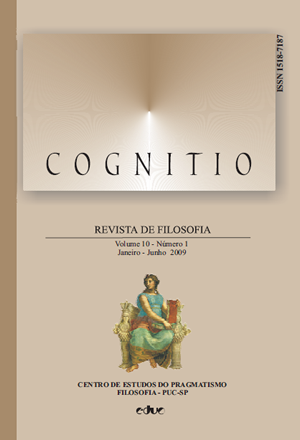O Significado do Pragmatismo: James sobre as Consequências Práticas da Crença
Palavras-chave:
Pragmatismo, Máxima pragmática, prático, William James, Charles S. Peirce, Arthur O. Lovejoy, Teoria do significativo.Resumo
Na terceira palestra de seu Pragmatismo, em 1907, William James apresentou admiravelmente sua teoria pragmática do significado, formulando a simples pergunta: “que diferença prática faria a alguém se esta noção, e não aquela fosse a verdadeira?” Por conseguinte, o método pragmático de James de esclarecer o significado das concepções foi, simplesmente, determinar o que ele chamou de suas respectivas “consequências práticas”.
Todavia, a aplicação de James do seu próprio método pragmático, todavia, tornou-se propensa a suscitar questões sobre o que ele entendia exatamente por noção central de “consequências práticas?” Já em 1908, Arthut O. Lovejoy propôs que James confundia os dois critérios incongruentes da significabilidade das proposições. Conforme o primeiro critério, uma proposição é significativa caso faça referência ou preveja experiências futuras, independentemente de a proposição ser crível ou não; conforme o segundo, uma proposição é significativa se a crença nela resulta em algumas experiências por parte do crente, a despeito do fato de que nenhuma afirmação pode ser deduzida de sua verdade por meio de experiências futuras. Muitos comentaristas solidários, posteriormente, seguiram o exemplo de Lovejoy, sustentando que existe uma dualidade inerente ao pragmatismo de James sobre o significado. Tem sido considerado frequentemente que, para James, apenas eventos subjetivos e interesses desempenham um papel na determinação pragmatista não só do significado, como também da verdade da proposição.
Neste trabalho, argumentarei que a objeção de Lovejoy é equivocada em sua alegação principal. Os dois critérios que Lovejoy destaca não são incogruentes: pelo contrário, sob uma visão pragmatista, estão intrinsecamente relacionados. Se uma proposição tiver significado à luz do primeiro critério, será significativa pelo segundo e vice-versa. Além de arguir pela consistência da opinião de James, será demonstrado que seu pragmatismo é muito mais fiel à formulação original do “terceiro grau de clareza” pragmática de Charles S. Peirce, do que comumente se pensa.









